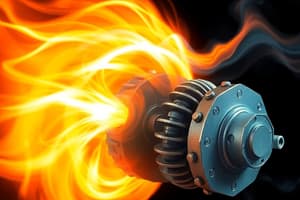Podcast
Questions and Answers
What is an atom?
What is an atom?
- A certain stage of an animal
- A large drinking cup
- The smallest component of an element (correct)
- Old bones of ancient creatures
What is a beaker?
What is a beaker?
A large drinking cup or glass with a wide mouth
Define a chemical.
Define a chemical.
A substance produced by or used in a chemical process
What does data refer to?
What does data refer to?
What is electricity?
What is electricity?
What is a fossil?
What is a fossil?
What keeps you glued to the ground?
What keeps you glued to the ground?
What is a hypothesis?
What is a hypothesis?
What is immunology?
What is immunology?
What is a laboratory?
What is a laboratory?
Define a mineral.
Define a mineral.
What does it mean to observe?
What does it mean to observe?
What is a phase?
What is a phase?
What does quantum refer to?
What does quantum refer to?
What is radiation?
What is radiation?
What is science?
What is science?
What is a theory?
What is a theory?
What does volcanology study?
What does volcanology study?
Define weather.
Define weather.
What is zoology?
What is zoology?
What is a jet stream?
What is a jet stream?
Define kilogram.
Define kilogram.
What is a neutron star?
What is a neutron star?
What is the universe?
What is the universe?
What is an x-ray used for?
What is an x-ray used for?
What is a yolk?
What is a yolk?
Flashcards are hidden until you start studying
Study Notes
Key Scientific Terms
- Atom: Fundamental unit of matter; consists of a nucleus (protons and neutrons) and electrons. The number of protons defines the element's identity.
- Beaker: A large glass vessel with a wide mouth, commonly used in laboratories.
- Chemical: Substance formed through chemical processes.
- Data: Information gathered and analyzed in scientific studies.
- Electricity: Study of electric charges and current flow.
- Fossil: Remnants of ancient organisms, typically found in sedimentary rock layers.
- Gravity: The force that attracts objects toward the Earth, keeping them grounded.
- Hypothesis: An educated guess based on prior knowledge and observations, pending testing and validation.
- Immunology: Science branch focusing on the immune system and responses to diseases.
- Laboratory: Controlled environment for conducting scientific experiments and research.
- Mineral: Naturally occurring substances like coal, iron, and diamonds, characterized by their chemical composition and physical properties.
- Observe: The act of carefully watching and noting phenomena in scientific experiments.
- Phase: Distinct stage in the life cycle of a living organism or the state of matter.
- Quantum: Concept referring to discrete quantities or amounts in physics.
- Radiation: Energy emission in the form of particles or waves, significant in various scientific disciplines.
- Science: Systematic study of the natural world through observation and experimentation.
- Theory: A well-substantiated explanation based on a body of evidence, understood as potentially mutable.
- Volcanology: The scientific study of volcanoes, lava, and related geological phenomena.
- Weather: Short-term atmospheric conditions, including temperature and precipitation variations.
- Zoology: The scientific study of animals and their behavior, physiology, and classification.
- Jet Stream: High-speed air currents in the atmosphere located around 11 kilometers above the Earth's surface, influencing weather patterns.
- Kilogram: Standard unit of mass in the metric system, commonly used in science and commerce.
- Neutron Star: Dense stellar remnant formed after a massive star undergoes a supernova, primarily composed of neutrons.
- Universe: Totality of all matter, energy, planets, galaxies, and cosmic entities in existence.
- X-ray: Imaging technique used to view internal structures of objects, commonly used in medical settings to examine bones.
- Yolk: The nutrient-rich yellow part of an egg, essential for the development of embryos.
Studying That Suits You
Use AI to generate personalized quizzes and flashcards to suit your learning preferences.




